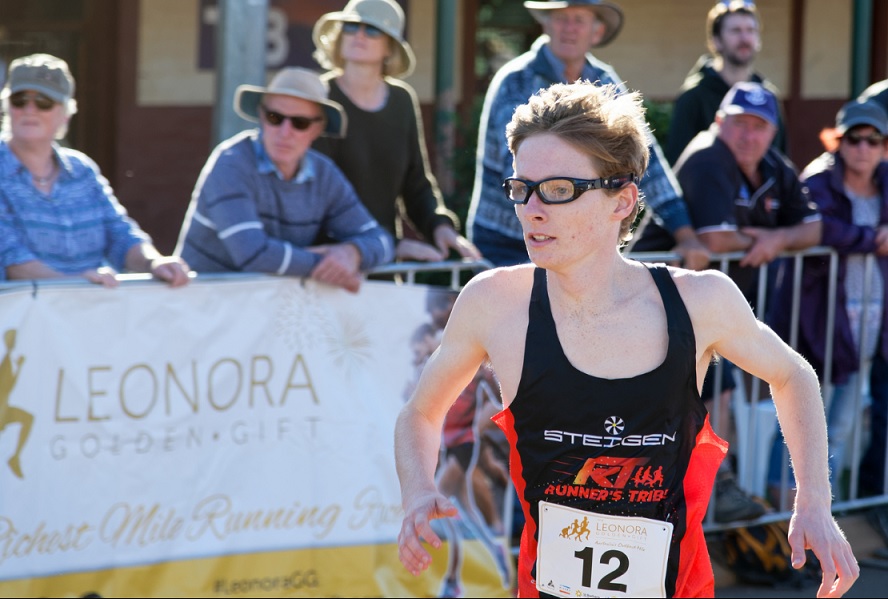Calloused feet run smooth along the road. One runner looks across, her eyes bright, her laugh a beautiful interlude to the soft rhythmic pattering of feet. This is Leonora. A town I fell in love with over one weekend. It’s red dirt. It’s people. A mining town in the heart of Western Australia. The home of a great Australian footrace.
Why do I run?
This is a question that has lingered unanswered in my mind for four years. Was it the accolades? The adulation? The recognition? The self-satisfaction? The freedom? Whatever the reason, and maybe it is a mix of all of them, there is one that now rises above all. I run to show people what is possible, that they too can dream. Life is hard, tough, unforgiving, but the mind is powerful. Leonora taught me this.
As I prepared to tell my story to the local school, it was hard to imagine life as a kid in the town. I imagined the hardship, the isolation, the restricted opportunity. These things are a reality for those kids, but for the small time I spent with them, you would never know. They had cheeky smiles, an immense curiosity, and an inexhaustible ability to run all day. Against all the odds, and even if only fleeting, happiness transcends all other emotions.
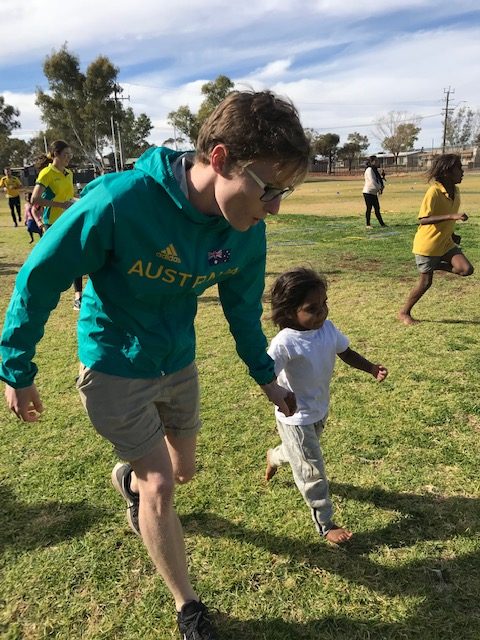
It was clear to me that they were inspired by local hero Kiara Reddingius. When she spoke, they would listen. It was the same for my coach Philo Saunders, his wise words encouraging them to focus on the positive aspects of life. For myself and training partner Michael Roeger, there were infinite questions: How do you run when you cannot see? How did you lose your arm? One of the highlights though was when Keely Small handed around her Youth Olympic gold medal.
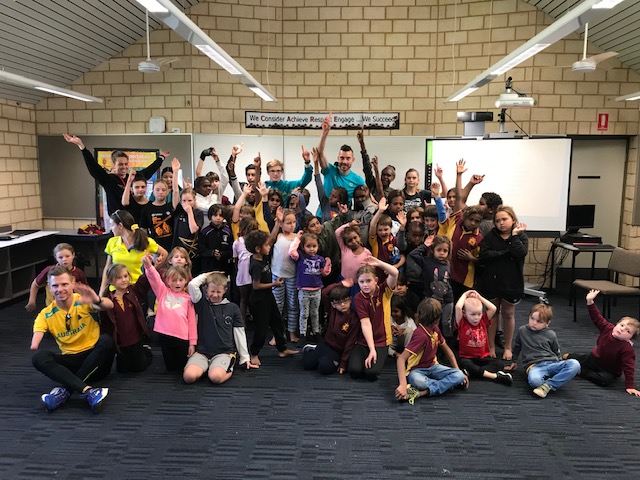
From that day onwards, every venture into town would result in us being swamped by the kids on their scooters, and promises that they would cheer as loud as they could on race day As they followed us around, they would seek advice, their excitement growing as the day of their own junior races drew nearer. It was touching to know that they cared, that they were invested in their own performance. It was the engagement, and the knowledge that this could spread to the classroom, that meant the most to the teachers. Whatever the interpretation, these interactions are symbolic of the power that the Golden Gift brings to Leonora.
For myself, the weekend was an opportunity to experience life outside the metropolitan bubble. My parents had worked for years in remote communities, so this was my chance to explore a part of their world. It was also a chance to improve my writing. I had never covered an event, nor been required to meet any kind of deadline. The race itself existed more as a reason to be there, my fear of the famous hairpin bends making me uneasy about toeing the line. It was only days out from the race when I finally committed to giving it a crack.
After spending Saturday at the horse races – highlighted by stunning performances from those that graced fashion on the field, most notably James Nipperess – I commenced my preparations for the heats that were to be held later that night. The previous day, Philo and I had practised over and over the process of how I would navigate each turn. After some discussion, we decided that I would follow him during the race, as well as listen for the call from fellow runners standing on the sideline, who had agreed to count down the steps to each corner. It would be out of my comfort zone, but the support of my peers, forever strong, gave me the courage to put everything on the line.
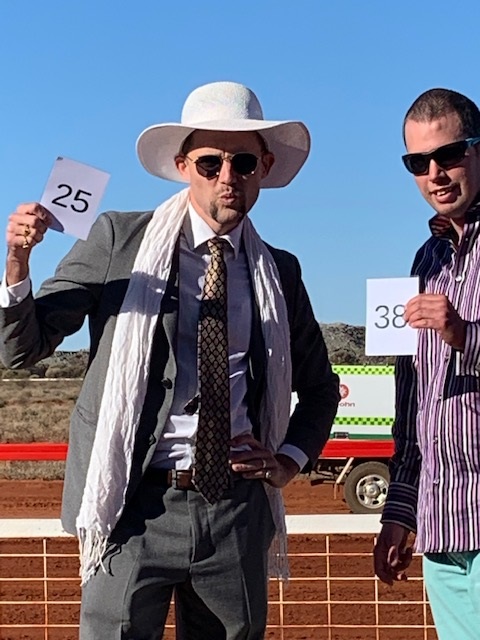
At the sound of the gun, I moved straight to the back of the pack. Through the first two corners, I followed Philo with ferocious intent, believing that if I lost sight of his legs, my race would be over. After one lap, I could sense that the leaders, and my chances of qualifying for the final, were pulling away. From the crowd, I could hear my name being yelled, the school kids keeping their promise to cheer me on. In a split second, instinctually, I realised the insignificance of my fear. Those kids were as tough as nails, and I needed to toughen up too. What was the worst that could happen? A couple of knocked over cones, and at worse a few scratches. It was time to start racing for real.
Trusting the verbal countdown into each corner, I used the long straights to pursue the leaders. Although I had no way of confirming my position, common sense assumed that Stewart McSweyn would be leading. With this in mind, when I found the back of Australian 1500m medallist Rorey Hunter, it dawned on me that my hopes of a finals berth were not lost. At the cost of a couple of cones, I emptied the tank in a last-ditch effort to qualify. In the end, I lost to Hunter by 0.32 seconds but scraped into the final by 0.06 seconds in a non-automatic position. Earlier, I had dismissed any suggestion of qualifying for the final with disbelief, but somehow that is exactly what transpired.
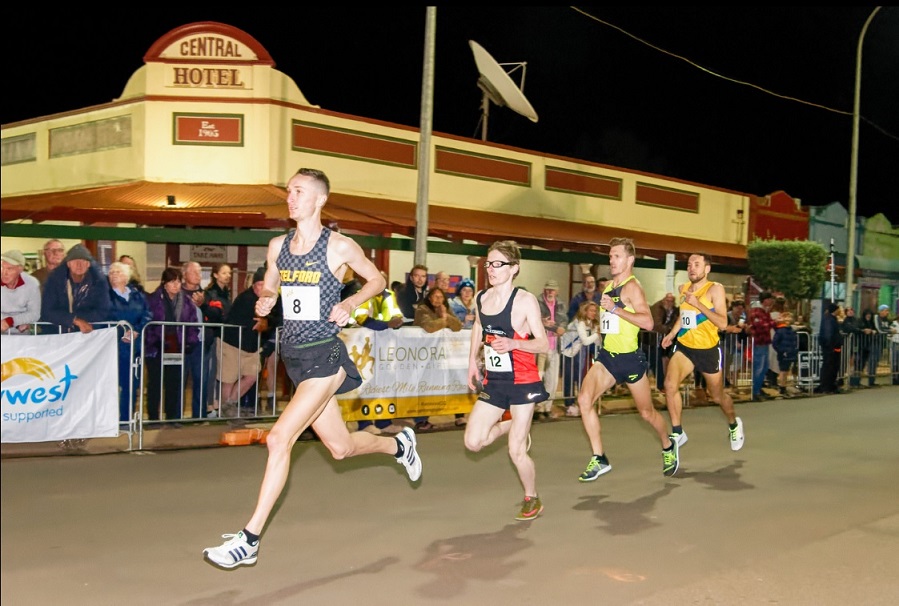
I soaked it up by chatting to the locals, even an old lady named Anne, who had been born in the region in 1935. She adored the meet, squeezing my hand as she recounted her own memories of running in the town during her youth. This was followed by a live performance from one of Australia’s most popular singers Pete Murray. Within minutes the main street transformed into an exuberant dancefloor, the pub overflowing with hearty enthusiasm. As the night drew to a close, fireworks dressed the desert sky in traditional red. Later as I lay in bed, my blankets wrapped tight around me to ward off the cold, I realised the importance of the Golden Gift to Leonora. The joy and entertainment that it brings is one thing, but for the kids, it is the opportunity to excel at something that will remain with them forever.
Sunday is a spectacle of heart-warming moments. Running predominantly in bare feet, the kids wore their hearts on their sleeves as they ran the races that they had prepared for so diligently. One particular moment comes to mind of the young winner of the Moneghetti medal. Unperturbed by the loss of his shoes on the first turn of the open mile, he remained determined, unwavering in pursuit of his goal. With the crowd on their feet, he persisted, eventually crossing the line to complete a courageous effort. He would compete in every race, a trend mirrored by his classmates throughout the day.
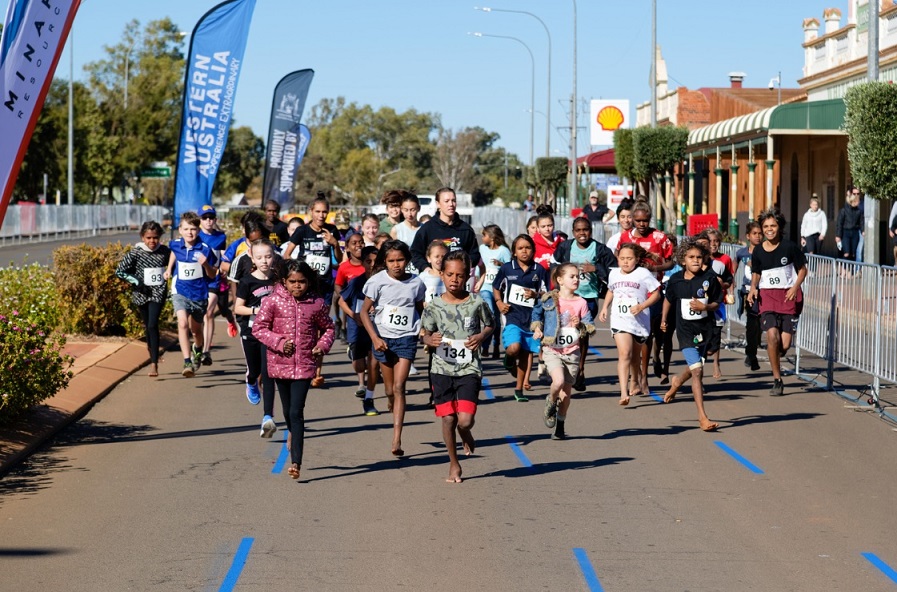
For me, my final went as expected. Won by the favourite McSweyn in a record time of 4:05, the race splintered as early as turn one. From then on it was a battle of attrition, the legs weary from the weekend’s festivities. In my first appearance, sixth place was enough for the kids to call me over to the fence. They hugged and high-fived me, pouring onto the course to surround me in celebration. I had only met them two days before, but I knew every one of them. Their laughter etched in memory, a moment that I will never forget.
Later that night, as I sat on my plane to Melbourne, I thought back to my question: why do I run? After my time in Leonora, I am assured of my answer. I witnessed the freedom of running, the hope that it can give. The power of the Golden Gift goes far beyond the prize money it gives its elite athletes. This is about much more than that. It shows what is possible, and that with the right motivation and opportunity, the kids of Leonora can have the world at their feet. Without a shadow of a doubt, this is the most important race on the Australian calendar. It is a testament to running and all the good that it possesses.
